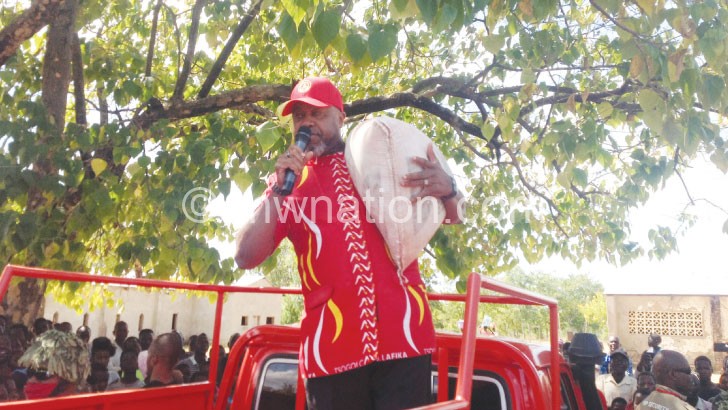Scary road to fresh polls
Malawi is already witnessing ugly scenes of political violence ahead of the fresh presidential election. Lasyt Friday, Vice-President Saulos Chilima’s motorcade was attacked in Phalombe and on Saturday President Peter Mutharika’s running mate Atupele Muluzi was forced to cancel a political rally at Mponela, Dowa following similar scenes believed to be in retaliation of the Phalombe incident. Amidst this scare, what does the future hold? Our News Analyst SUZGO CHITETE ponders on this question.

It is a familiar script. Before the May 21 2019 Tripartite Elections—the country witnessed a sustained spate of violence. The same has happened in previous elections where blood was shed.
In Lilongwe’s Area 24, a family that sought shelter in a UTM Party office was petrol-bombed and three died while others still nurse painful wounds that will forever remind them of an ugly past.
No one has been brought to book to account for this heinous crime and the police’s lack of action heightens suspicion that this terror could be sponsored by the governing party.

In the current wave of violence ahead of the fresh presidential election ordered by the courts, there is an interesting pattern.
Not only the opposition is being targeted. The governing party is falling victim too.
on May 7, the President’s convoy was attacked in Ndirande, Blantyre. And just last Friday, Chilima’s motorcade was stoned in Phalombe, with a minibus carrying journalists to cover a Tonse Alliance rally being stoned.
The following day, Muluzi, was forced to cancel a whistle-stop at Mponela, Dowa, as the road was blocked, with young people burning tyres in the middle of the road.
Muluzi on Saturday spoke with certainty that the Mponela incident was orchestrated by leaders of Tonse Alliance. He mentioned Malawi Congress Party (MCP) president Lazarus Chakwera and UTM leader Saulos Chilima as masterminds of the attack.
This, Muluzi said, is according to their intelligence.
“We have intelligence that this was been organised. We have seen this on social media that they are going to attack my convoy. Where are these leaders? Why are they not speaking up? They are responsible for this,” Muluzi stated.
Asked about what his intelligence said about the Phalombe incident, the UDF leader once again blamed the opposition as being responsible for all the violent clashes since Mutharika’s nullified election last year.
It is not surprising that Muluzi’s finger points one way—towards the opposition. Mutharika too sees it the same way.
In a statement released at the weekend, Mutharika lambasted his political opponents—somehow justifying the Phalombe assault as some revenge for his attack in Ndirande.
It reads in part: “The President would also like to register his disappointment with the conduct of opposition political party leaders to end political violence and hate speech in the country.
“The political violence in Phalombe and Mulanje on Friday comes on the background of opposition party leaders and their supporters celebrating and praising the violence opposition-sponsored hoodlums inflicted on innocent DPP supporters who were innocently escorting the President’s convoy in Ndirande Township recently.”
In an interview, MCP spokesperson Reverend Maurice Munthali fires back at Muluzi, counter-accusing Mutharika’s DPP of perpetrating violence in opposititon to the fresh presidential election.
He says the culture of violence is deep-seated because it is sponsored by the regime and the police deliberately pay a blind eye.
In an interview, a senior officer at the National Police Headquarters in Area 30, Lilongwe, who did not want to be named shared some insights: “It is very likely that the violence that took place in Phalombe was organised by agents of the ruling party. it is unlikely that people in Phalombe would do it alone without influence or someone telling them what to do.
“Same thing in Mponela—the violence may have a hand of the opposition. It is some tit-for-tat. I think the opposition may resort to violence because they know that even if they report to police, nothing will happen especially where the perpetrators have a connection to the ruling party.”
Centre for Multiparty Democracy (CMD) director Kizito Tenthani says political parties must genuinely denounce violence.
He reckons “the State President holds the key” to ending violence likely to create no-go zones in multiparty Malawi.
Tenthani believes that these violent acts are sanctioned by senior party officials who fund them.
“The issue of political violence can end if the leaders make a bold statement instead of making that veiled statement. For instance, if the head of State instructs the Inspector General of Police that tomorrow I need a report, arrest and prosecute wrongdoers within a day, it can stop. But what we see is lack of taking responsibility,” he states.
Tenthani’s centre has visited several districts to establish the cause of violence and the findings are shocking.
“We established that usually those that engage in violence are imported from elsewhere,” he says.
The Human Rights Defenders Coalition, who spearheaded mass protests against electoral irregularities and impunity, believes there is a hidden hand bankrolling the violence.
The group believes that the police service, especially the appointees at the helm, are too politically compromised to clamp down on the wave that threatens the country’s democracy.
They hold that the security agency is captured by governing party decoys and bootlickers, who cannot lift a finger or handcuff the violent thugs in cases where the violent attacks are masterminded by pro-regime groups.
The coalition has threatened to reveal a list of the brains behind the terror attacks, according to its acting chairperson Gift Trapence. Until the real culprits are caught and brought to book —political violence is likely to continue to the detriment of the hard-earned democracy.





